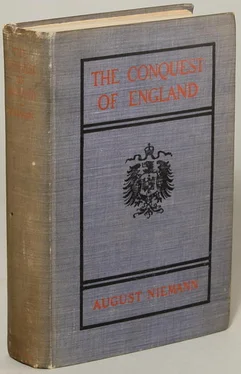“It will only be a precautionary measure, Highness! perhaps disturbances have broken out again in Afghanistan.”
“Disturbances in Afghanistan, do you say? Then Russia must have a hand in it. Can you perhaps give me more definite information?”
Heideck had to express his inability to do so, and the Maharajah, who did not conceal his vexation, began to open his heart to the stranger in a rather imprudent way.
“I am a faithful friend of the English, but the burden they lay upon us is becoming every day more intolerable. If England is bent upon war, why should we sacrifice our blood and treasure upon it? Do we not know full well what powerful foes England has? You do not belong to this nation, as my Minister informed me; you are in a position, therefore, to instruct me about these matters. It is true I have been in Europe, but I was not permitted to go beyond London, whither I had proceeded to congratulate the late Queen on her birthday. I have seen nothing but many, many ships and a gigantic dirty town. Are there not in Europe strong and powerful states hostile to England?”
Such questions were disagreeable for Heideck to answer, and he therefore preferred to avoid giving a definite reply.
“I have been in India for nearly a year,” he replied, “and know about such political matters only what the India Times and other English newspapers report. Of course, there is always a certain rivalry among the European great Powers, and England has, during the past few decades, become so great that she cannot fail to have enemies; but on this point, as also on that of the present political situation, I do not venture to express an opinion.”
The Maharajah gloomily shook his head.
“Transact the business with this gentleman in the way you think best,” he said, turning abruptly to his Minister, a wave of the hand at the same time denoting to the young German that the audience was at an end.
As Heideck again stepped into the loggia he saw Captain Irwin appear at the entrance door in company with an official of the Court. The British officer started on perceiving the man who passed for a commercial traveller. He cast at him a malicious look, and an almost inimical reserve lay in the manner with which he returned Heideck’s salutation. The latter took little notice, and slowly wended his way through the extensive park, in whose magnificent old trees monkeys were disporting themselves. The Maharajah’s communication to him as to the English orders which he had received, taken in conjunction with General Ivanov’s advance, entirely preoccupied him. After this he was no longer in doubt that serious military events were impending, or were even then in full swing. Quetta, in Beluchistan, lying directly on the Afghan frontier, was the gate of the line of march towards Kandahar; and if England was summoning the Indian princes to its aid the situation could be none other than critical. War had certainly not yet been declared, but Heideck’s mission might, under the circumstances, suddenly acquire a peculiar importance, and it was, at all events, impossible to make at this moment any definite plans for the immediate future.
The walk to his bungalow in the immediate vicinity of the English camp took perhaps an hour, and was sufficient to give him a keen appetite. He was not, therefore, at all disappointed to find his Russian comrade sitting at breakfast in a shady spot before the door of the hotel, and, heartily returning his salutation, he lost no time in seating himself at the table. Prince Tchajawadse looked pale, and applied himself to soda-water, which, contrary to all established usage, he drank without the slightest admixture of whisky. The appetising dish of eggs and bacon was standing untouched before him, and he smiled rather sadly when he saw what an inroad his guest made upon it.
They had hardly exchanged a few commonplace words when two Indian girls made their appearance, offering all sorts of nicknacks for sale. The younger, whose bare breast glowed like bronze, was of marvellous beauty, even the paint on her face could not destroy the natural grace of her fine features. Yet, beautiful as she was, she was as great a coquette. She had evidently determined to make an impression on the Russian. Stepping behind his chair, she held her glittering little wares before his face. Her manner became more and more intimate. At length she slipped a golden bracelet on her slender brown wrist and bent, in order that he should notice it, so far over his shoulder that her glowing young breast touched his cheek.
Prince Tchajawadse was of too passionate a temperament to long resist such a temptation. His eyes flashed, and with a rapid movement he turned round and embraced the girl’s lithe body with his arm.
A stop was put to further familiarities, however, for this little adventure, which was very distasteful to Heideck, was suddenly interrupted.
Without being perceived by those sitting at the table, the handsome young page of the Prince had stepped from the door of the bungalow with a plate of bananas and mangoes in his hand. For a few seconds he regarded with flashing eyes the scene just described, and then, stealing nearer with noiseless steps, flung, without saying a word, the plate with the fruit with such vigour and unerring aim at the dark beauty, that the girl, with a loud cry, clasped her hand upon her wounded shoulder, while the fragments of china fell clattering to the ground.
The next moment she and her companion had disappeared in hurried flight. The Prince’s face was livid with rage; he sprang up and seized the riding-whip which lay near him.
Heideck was on the point of intervening in order to save the disguised girl from a similar punishment to that which his new friend had meted out the day before to his Indian “boy,” but he soon saw that his intervention was unnecessary.
Standing bolt upright and with an almost disdainful quiver of his fair lips, the young page stepped straight up to the Prince. A half-loud hissing word, the meaning of which Heideck did not understand, must have suddenly pacified the wrath of the Russian, for he let his upraised arm fall and threw the whip on to the table.
“Go and fetch us another plate of dessert, Georgi,” he said quietly, as if nothing had happened. “It’s a confounded nuisance, that these Indian vagabonds don’t allow one a moment’s peace.”
A triumphant smile played across the face of the Circassian beauty. She threw a friendly glance at Heideck and silently returned to the bungalow. Full of admiration and not without a slight emotion of envy for the happy possessor of such an entrancing female beauty, Heideck followed her with his eyes, as she tripped gracefully away with her lithe graceful figure. A remark was just on the point of passing his lips, acquainting the Prince that he had discovered the certainly very transparent secret of his disguised lady companion, when he was prevented doing so by a fresh incident.
An English soldier in orderly’s uniform stepped up to the table and handed Heideck, whom he must have known by sight, with a military salute, a letter.
“From the Colonel,” he said, “and I am ordered to say that the matter is urgent.”
With surprise, Heideck took the missive. It contained in polite, but yet somewhat decided terms, a request that Herr Hermann Heideck would favour him with a visit as soon as possible. This, considering the high official position that Colonel Baird occupied in Chanidigot, was tantamount to a command, which he was bound to obey without delay or further excuse.
Baird was the commander-in-chief of the detachment stationed in Chanidigot, consisting of an infantry regiment, about six hundred strong, a lancer regiment of two hundred and forty sabres, and a battery of field artillery. As in all the other residences of the great Indian chiefs, the British Government had stationed here also a military force, strong enough to keep the Maharajah in respect and to nip all seeds of insurrection in the bud. As Colonel Baird, moreover, occupied the position of Resident at the Court of the Prince, and thus combined all the military and diplomatic power in his own person, he had come to be regarded as the real lord and master in Chanidigot.
Читать дальше












